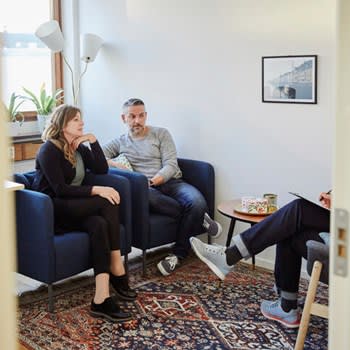Can You Get Disability for Anxiety and Depression?
- Can you get disability for anxiety and depression? These are both potentially serious conditions that can make it hard to work. Learn about your options.

Can You Get Disability for Anxiety and Depression?
Anxiety and depression are both potentially serious mental health issues that can develop into severe disabilities if left untreated. If you have anxiety and/or depression, you may have trouble holding a job or earning enough money to support yourself. The Social Security Administration offers SSDI benefits for mental health-related disabilities, including anxiety and depression.

Learn More About Medicare
Join our email series to receive your free Medicare guide and the latest information about Medicare.
By clicking "Sign me up!" you are agreeing to receive emails from HelpAdvisor.com
Thanks for signing up!
Your free Medicare guide is on the way.
Make sure to check your spam folder if you don't see it.
Anxiety and Depression
According to the Anxiety and Depression Association of America (ADAA), in 2017, there were 17.3 million adults over 18 who had been diagnosed with depression, and anxiety disorders affect 40 million adults in the United States. These numbers include older adults who may have fewer resources to cope with their effects.
Unlike normal sadness and worry, which can affect anybody, clinical anxiety and depression do not have obvious external causes and can seriously impair your ability to live a normal life. People with disabling anxiety and depression often earn less money, have fewer social contacts and live shorter lives than people without the disorders. If you think you might be suffering from either anxiety or depression, it's important to seek competent mental health services as early as you can.
While only a qualified mental health professional can diagnose you with an anxiety disorder or depression, only you know how you feel. Pay attention to the signs of anxiety and depression, and seek help if you notice distress from any of these symptoms.
Signs of Anxiety
Anxiety is a common condition that goes far beyond the normal worries and concerns people get as part of life. Mental health professionals recognize about 10 major types of anxiety disorder, from specific phobias to panic disorders. Here are some of the most prevalent symptoms they have in common:
- Excessive nervousness without an apparent external cause
- Feeling a sense of impending doom, or suddenly developing a bout of panic for no obvious reason
- Persistent restlessness or tension that doesn’t go away on its own and doesn’t seem connected to a clear cause
- Elevated heart rate that is not connected to exercise or other likely causes
- Hyperventilation
- Cold sweats
- Tremors in the hands or other parts of the body
- Fatigue and weakness, or feeling a pressing need to sleep at odd times; this can occur along with insomnia at bedtime
- Inability to concentrate
- Indigestion, acid reflux and other GI problems
- Avoidance of things you would normally do, in order to prevent feelings of anxiety
- Loss of social contact with friends and family, often associated with a fear of going outdoors or to unfamiliar places
Signs of Depression
Despite its name, depression is not just a feeling of sadness. Normal grief or melancholy are part of being human, but a depressive disorder imposes these and several other feelings with no clear external cause. Ask a mental health professional for an evaluation if you have these signs of depression:
- Unexplained sadness, bouts of crying and feelings of hopelessness
- Bouts of anger that are difficult to control and not connected to a legitimate cause
- Loss of motivation, or a loss of interest in activities you used to enjoy
- Disturbed sleep patterns, both sleeping too much and not being able to sleep at appropriate times
- Fatigue
- Loss of appetite and weight loss, or binge eating and rapid weight gain
- Unexplained feelings of anxiety and restlessness
- Altered or slow movements or speech
- Persistent feelings of worthlessness or a fixation on perceived past failures
- Memory problems
- Recurring thoughts of death, suicide and harming others, even if they don’t feel serious
- Physical pain that lacks an obvious cause, such as recurring headaches or chronic back pain
Getting Disability Benefits for Mental Health Issues
The Social Security Administration acknowledges the impact that anxiety and depression disorders can have on a person’s ability to make a living and get by in society. Both of these families of conditions are considered qualifying medical disorders for establishing eligibility for disability payments.
The process of applying for disability with anxiety or depression is the same as it is for physical disabilities. In order to get benefits, you must submit an application with the Social Security office in your local area. Be prepared to submit documentation of your condition from a doctor or psychiatrist who has treated you. Ask relatives, friends and people who know you whether they can write brief statements about how your mental health and ability to function have been affected by the anxiety or depression. These statements are not definitive, but they can help paint a whole picture for the disability eligibility reviewers.
If your initial claim for disability benefits has been rejected, which is common for first-time applications, you may have to appeal the administration’s decision. Consider hiring a lawyer who specializes in disability cases to help you prepare your appeal. Many lawyers in this field work with mental health professionals who have experience working with people who have anxiety disorders or clinical depression, as well as experience filling out the necessary forms to help you claim the disability benefits you’re entitled to. A disability lawyer will usually work on contingency and ask for between 30% and 40% of your initial settlement.
Living With Anxiety and Depression
If you have the symptoms of an anxiety or depressive disorder, getting the disability payments you need to get by can be just the beginning of the battle. Don’t hesitate to seek out the help you need to manage these chronic conditions, and lean on your family and friends for the emotional support you need to get through difficult periods.
Where to Get Help
The Anxiety and Depression Association of America lists several helpful resources that can connect you with others nearby who also have anxiety and depression that interferes with normal living. You can also find groups and treatment resources in your own ZIP code by searching the federal Substance Abuse and Mental Health Services Administration (SAMHSA)’s online resource database. These resources are free, and the communities and providers they connect you with can often help you at reduced or no cost. You do not have to give your information to SAMHSA when you search their database for help.


